 | |
Syria | United Kingdom |
|---|---|
Since the Syrian civil war, the United Kingdom has supported the Syrian opposition. [1] The United Kingdom closed its embassy in Syria in 2011, and the Embassy of Syria, London was closed the following year. [2]
 | |
Syria | United Kingdom |
|---|---|
Since the Syrian civil war, the United Kingdom has supported the Syrian opposition. [1] The United Kingdom closed its embassy in Syria in 2011, and the Embassy of Syria, London was closed the following year. [2]
| | This section needs expansion. You can help by adding to it. (April 2021) |

On 6 November 1956, during the Suez Crisis, a Royal Air Force Canberra PR.7 was sent to overfly Syria on a photo reconnaissance mission, and was shot down by a Syrian Air Force Gloster Meteor. As of 2022, this was the last RAF aircraft shot down in an enemy air-to-air engagement. [4] [5]

In 2001, positive relations were developed between Prime Minister Tony Blair and the Syrian government, as part of the War on Terror. [6]
In 2002, President Bashar al-Assad made an official visit to the United Kingdom, the first Syrian leader to do so. [7] He and his wife Asma met with Queen Elizabeth II. [8]
In 2003, the British Syrian Society was established in London by Fawaz Akhras, father-in-law of Bashar al-Assad. [9]
Since the 2011 civil war, relations have deteriorated, and the UK was one of the first countries to recognise the opposition as the sole legitimate representative of the Syrian people. [1]
The Embassy of Syria in London closed in 2013.
In 2018, the UK took part in the missile strikes against Syria alongside the United States and France. [10]
In March 2021, the British Government placed sanctions on key allies of Assad. [11]
British prime minister Keir Starmer and foreign secretary David Lammy welcomed the fall of the al-Assad regime on 8 December 2024. [12] [13]

Ensuring national security, increasing influence among its Arab neighbours and securing the return of the Golan Heights, have been the primary goals of the Syrian Arab Republic's foreign policy. At many points in its history, Syria has seen tension with its neighbours, such as Turkey, Israel, Jordan, Iraq, and Lebanon. Syria enjoyed an improvement in relations with several of the states in its region in the 21st century, prior to the Arab Spring and the Syrian civil war. Until 2018, due to the Syrian civil war, the Syrian Arab Republic's government was partially isolated from the countries in the region and the wider international community.

Bashar al-Assad is a Syrian politician and military officer who served as the 19th president of Syria from 2000 until his government was overthrown by Syrian rebels in 2024. As president, Assad was the commander-in-chief of the Syrian Armed Forces and the secretary-general of the Central Command of the Arab Socialist Ba'ath Party. He is the son of Hafez al-Assad, who was the president from 1971 until his death in 2000.

Adel al-Jubeir is a Saudi diplomat serving as the Minister of State for Foreign Affairs since 2018. He also serves as a Member of the Council of Ministers of Saudi Arabia and has been the Climate Affairs Envoy since 2022. Notably, he is the second non-royal to hold the office of the Minister of State for Foreign Affairs, succeeding Ibrahim bin Abdullah Al Suwaiyel. Previously, al-Jubeir was the Saudi Ambassador to the United States from 2007 to 2015 and a foreign policy advisor to King Abdullah.
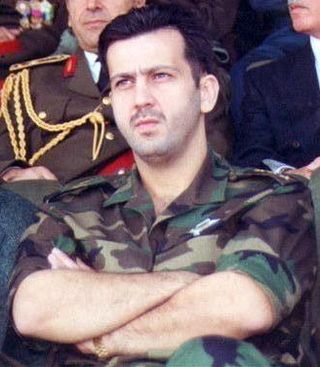
Major General Maher Hafez al-Assad is a Syrian former military officer who served as commander of the Syrian Army's elite 4th Armoured Division, which, together with Syria's Military Intelligence, formed the core of the country's security forces until the collapse of Al-Assad's regime in 2024. He is the younger brother of former Syrian president Bashar al-Assad, and also was a member of the Central Committee of the Syrian Ba'ath Party.
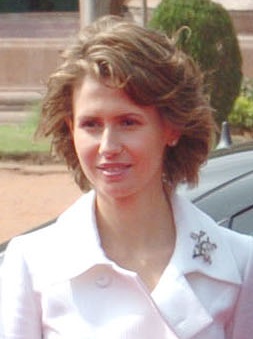
Asma Fawaz al-Assad is the former first lady of Syria, as the wife of Bashar al-Assad during his tenure as president from 2000 until he was overthrown on 8 December 2024. Born and raised in London to Syrian parents, she became First Lady when she married al-Assad, then President of Syria, on 13 December 2000.
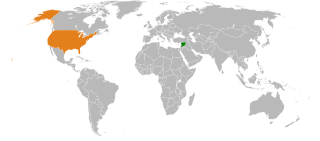
Diplomatic relations between Syria and the United States are currently non-existent; they were suspended in 2012 after the onset of the Syrian Civil War. Priority issues between the two states include the Arab–Israeli conflict, the Golan Heights annexation, alleged state-sponsorship of terrorism, etc. Although relations began in 1835, but as of 2024, the United States had began to work with the new Syrian regime after the collapse of the former regime under the Assad family.

Russia–Syria relations are the bilateral relations between Russia and Syria. Russia has an embassy in Damascus and Syria has an embassy in Moscow. Russia enjoys a historically strong, stable, and friendly relationship with Syria, as it did with most countries within the Arab World up until the Arab Spring. Russia's only Mediterranean naval base for its Black Sea Fleet is located in the Syrian port city of Tartus.
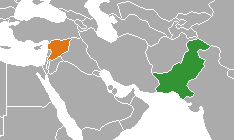
Pakistan–Syria relations are the historic, international, and bilateral relations between Syria and Pakistan. Syria has an embassy in Islamabad. Pakistan is represented in Syria through its embassy in Damascus and honorary consulate in Homs. Through the ancient civilization exchange, areas of modern Pakistan were part of the silk route with the Syria and for centuries, Syrian Islamic missionaries that introduced Islam in the parts of now integrated in Pakistan after 711 AD were from Syria.
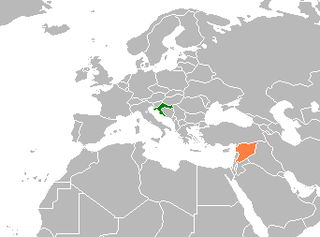
Croatia–Syria relations are bilateral relations between Croatia and Syria. Both countries established diplomatic relations on 29 August 1997. Croatia is represented in Syria through its embassy in Cairo in Egypt and an honorary consulate in Damascus. Syria is represented in Croatia through its embassy in Budapest, Hungary and an honorary consulate in Zagreb. Both countries are full members of the Union for the Mediterranean, although Syria suspended its membership in 2011.

The Embassy of Syria in London was the diplomatic mission of the Syria to the United Kingdom. The chancery is located at 8 Belgrave Square of London.

Syria–United Arab Emirates relations refer to the relationship between the United Arab Emirates (UAE) and Syria. The UAE has an embassy in Damascus and Syria has an embassy in Abu Dhabi and a consulate-general in Dubai. Both countries are members of the Arab League, part of the Middle East region and share close cultural ties.
International reactions to the Syrian civil war ranged from support for the government to calls for the government to dissolve. The Arab League, United Nations and Western governments in 2011 quickly condemned the Syrian government's response to the protests which later evolved into the Syrian civil war as overly heavy-handed and violent. Many Middle Eastern governments initially expressed support for the government and its "security measures", but as the death toll mounted, especially in Hama, they switched to a more balanced approach, criticizing violence from both government and protesters. Russia and China vetoed two attempts at United Nations Security Council sanctions against the Syrian government.
International demonstrations and protests relating to the Syrian Civil War have taken place outside Syria during the war.

Saudi Arabia–Syria relations refer to bilateral and economic relations between Saudi Arabia and Syria. Diplomatic ties between these two countries of the Middle East have long been strained by the major events in the region. Saudi Arabia has an embassy in Damascus, and Syria has an embassy in Riyadh. Both countries are members of the Arab League and share close cultural ties.

Oman–Syria relations refer to the relationship between the Sultanate of Oman and Syria. Oman has an embassy in Damascus; while Syria has an embassy in Muscat. Both are members of the Arab League, and despite the ongoing civil war occurring in Syria, Oman has not closed its embassy in Syria and both countries maintain diplomatic relations, in sharp contrast to other Arab states of the Persian Gulf who have cut off diplomatic ties with Syria and closed their embassies.
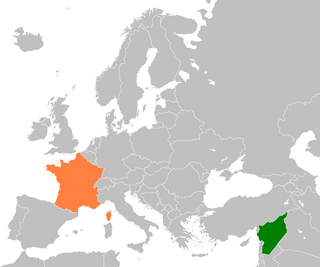
France–Syria relations refers to the bilateral relations between France and Syria. France had an embassy in Damascus and a consulate general in Aleppo and Latakia. Syria has an embassy in Paris and honorary consulates in Marseille and Pointe-à-Pitre.

Presidential elections were held in Syria on 26 May 2021, with expatriates able to vote in some embassies abroad on 20 May. This was the last presidential election to be held in Ba'athist Syria, prior to its overthrow following the 2024 Syrian opposition offensive.
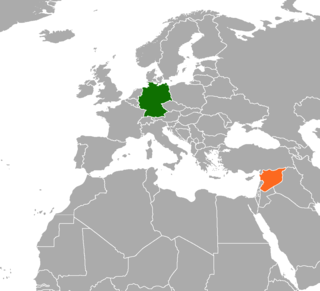
Germany–Syria relations are the bilateral relations between Germany and Syria. Germany closed its Damascus embassy and stopped its recognition of Bashar Al-Assad in 2012 because of the Syrian civil war, but did not cut relations with the former Ba'athist regime until its official collapse in late 2024.

Italy–Syria relations refer to bilateral relations between Italy and Syria. The Syrian embassy in Italy is located in Rome, whereas the consulate was located in Milan. In 2024, Rome made the decision to start a reaprochement with Syria and reopen its embassy in Damascus.

Qatar–Syria relations are the bilateral relations between Qatar and Syria. Qatar closed its Damascus embassy in 2011 until december 2024. Qatari government recognized National Coalition of Syrian Revolutionary and Opposition Forces and gave it the Syrian embassy in Doha. The relationship between both countries has changed significantly over the past few years, largely as a result of the civil war in Syria.